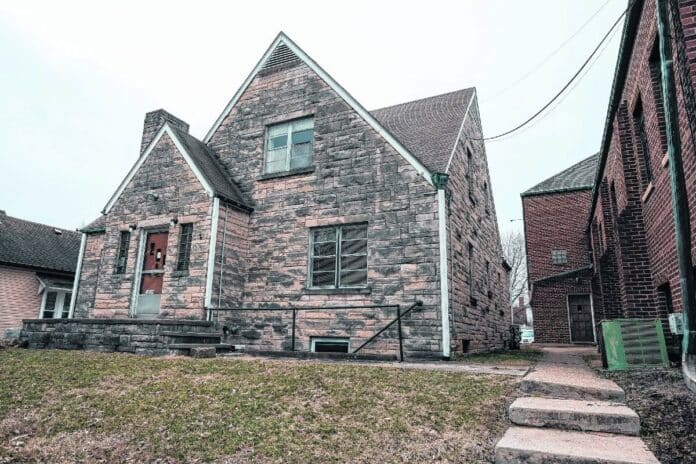
Now that several residential homes are assisting those in recovery from addiction in Bartholomew County, it’s easy to forget that the first home in Bartholomew County – the Chain Breaker House – opened just a little over a year ago.
Built in a 2,282-square-foot former church parsonage, the Chain Breaker House began taking in residents on Feb. 27, 2020 with a maximum of six clients at a time.
While it has sometimes been described as a treatment center or halfway house, the facility at at 1218 California St. is actually a Christian abstinence-based intake center for addicted males that is operated in conjunction with the Indianapolis-based Wheeler Mission.
"Wheeler handles the program and the personnel, while we handle the financing and provide the house," Chain Breaker Ministries board chairman Rick Colglazier said.
[sc:text-divider text-divider-title=”Story continues below gallery” ]
Men often arrive at the Chain Breaker House at one of the lowest points of their lives, he said.
"We’ve learned that at this time of their lives, they are in a very dark space," Colglazier said. "They are tormented by addictions. They’ve either hit rock bottom, become incarcerated, or are homeless. In some cases, families have been torn apart."
During a six to eight week orientation at the facility, every client undergoes a comprehensive assessment of their medical, emotional and social functioning skills, Wheeler Mission spokesman Dennis Abrams said. The staff also checks if the person has any warrants or legal problems.
While participants are asked to take responsibility for their past actions, many in the judicial system such as judges, probation department, jail administrators and law enforcement recognize the strengths of the program, according to Chain Breaker board member and Columbus attorney Peter King.
But organizers say it only works if individuals participating in it want it to work.
"One of the biggest gauges (during evaluation) is whether or not they are teachable," Abrams said. "Are they going to put in the effort to look at a different way to live?"
If it’s determined the client will not be receptive to the faith-based abstinence program, they are referred to other treatment providers, Colglazier said.
If and when the assessment in Columbus is successfully completed, eligible clients are moved to the 285-acres Camp Hunt near Bloomington to undergo a minimum of six months of long-term addiction treatment, organizers said.
"Once the men arrive at Camp Hunt, we have no expectations," Abrams said. "We take them as they are. We have non-believers, atheists — everybody is welcome."
But one common trait in the Christian faith the program looks for in their clients, according to Abrams, is a willingness to admit we all fall short, we all sin, and we all need saviors.
"By doing that and sharing our stories, it helps the guys realize they are not alone," he said.
Camp Hunt offers two programs that includes a six-month Addictions Recovery Program emphasizing relationships and taking ownership of addiction, and a nine-month Servant Leadership Program that trains men to teach and counsel others, Abrams said.
Most of the staff are recovering addicts that have successfully completed the longer program, so they can use themselves as an example of how Camp Hunt can improve their lives, Abrams said.
What makes the Chain Breaker House and Camp Hunt stand out from the competition is that there is no cost to enter the program, Colglazier said.
"Other (long-term addiction recovery) programs can have a pretty stiff price tag, but in a faith-based approach, they aren’t being asked to pay anything to come into this program," Colglazier said.
But nobody says the program will be easy. Participants receive no medication to help wean themselves off opioids.
It has long been a source of contention whether medications should be used during rehabilitation or only total abstinence. Doug Leonard, the executive director of the Alliance for Substance Abuse Progress in Bartholomew County, believes these arguments ignore individuality.
"We all have different physical makeups, different tolerances we may or may not be able to handle, different religious beliefs and different levels of fear," Leonard said. "So the nice thing about having so many different homes now in town is that an addicted person can seek out the one that works best for him or her."
In addition, Leonard said he knows of plenty of homes with an abstinence-based model that "work very, very well," adding that the role of ASAP is to encourage every group wishing to contribute towards recovery.
At Camp Hunt, there is a work component which might include housekeeping, building and maintenance work. Half of the camp’s $2 million annual budget comes from a pallet factory, while individual donors provide the rest of the funding.
Instead of just focusing on the individual, the program also attempts to reconcile the recovering addict with their family members in some way, so they can try to work through their problems together, Abrams said.
It is difficult to gauge how successful the Chain Breaker House and Camp Hunt programs have been during the COVID-19 pandemic.
"We came to a grinding halt for a while because everything was shut down," Colglazier said. "In the spring and early summer, we did not have many guys coming through. But the house remained open and we weren’t going to turn anyone away. Eventually, it began to resemble normalcy, as far as COVID-19 not being a direct impact for us."
So far, nine men have completed their orientation in Columbus before being sent to Camp Hunt, Abrams said. A few have completed the long-term treatment, but most are still at the Monroe County facility, he said. But a number of recovering addicts who came from Columbus would like the lengthier treatment to become employees themselves.
For this year, the Chain Breaker House has a goal to try to raise their level of attrition to at least 50% of people who complete the orientation program, the board chairman said.
When the Chain Breaker House started a year ago, board members estimated it would cost $150,000 annually to operate the facility. But over the past year, the house has kept costs under control. Besides obtaining meals through the Wheeler Mission resources, the clients also provide volunteer work at the Love Chapel in exchange for food. Getting the clients out in the community in a positive light has helped the Chain Breaker House become a welcomed member of the community, King said.
"Right now, we’re still trying to get a more distinct handling on the budget, but we think we can run the house on between $120,000 and $125,000," he said.
The organization has been very blessed to receive the support of many individuals and churches throughout the south central Indiana region, King said.
"The ministry can only do its work with support from our church community, as well as those who understand the large need in our community that Chain Breaker fills," King said.
[sc:pullout-title pullout-title=”Locations to help those in recovery” ][sc:pullout-text-begin]
There are now eight homes in Columbus that house residents striving to recover from addictions. Rather than a residential drug rehabilitation center, the Chain Breaker House is an intake center for evaluations.
- ASAP Sober Living (men)
- Carol’s House, operated by Faith Hope and Love Church (women)
- Chain Breaker House (men)
- Centerstone Transitional Home (men)
- Fresh Start Recovery (women)
- Oxford House: Remo (men)
- Oxford House: Luca (women)
- Transformational Life Ministries (men)
Source: Alliance for Substance Abuse Program in Bartholomew County
[sc:pullout-text-end][sc:pullout-title pullout-title=”For more information” ][sc:pullout-text-begin]
Those who seek long-term addiction recovery services through the Chain Breaker/Wheeler Mission program are not required to pay for the Christ-centered treatment that takes at least eight months to successfully complete.
Tax-deductible financial contributions are accepted at Chain Breaker Ministries, P.O. Box 2059, Columbus, IN 47202
Information: ChainBreakerMinistries.org
Phone: 812-390-7179 or 812-603-0906
[sc:pullout-text-end]




